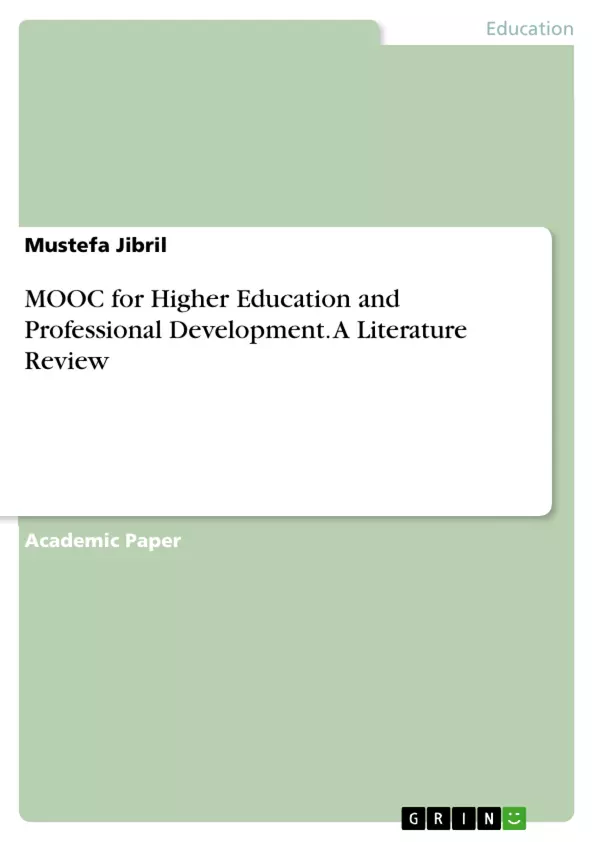The study reflects an overview of MOOC research for higher education (HE) and professional development (PD). Massive open online course (MOOC) has attracted the attention of educational stakeholders. The phenomenon has been studied from various perspectives at different points of time. Though few researchers stressed the impact of MOOC HE, some remain skeptical about its relevance to school education. MOOC is even researched on PD. However, we believe that HE and PD go side by side. There is no water-tight separation between the two. Such an argument leads us to go for this systematic review which included 81 publications of different forms within the time frame of 2008-2020. Connectivism theory remained the backbone of this research. A mixed-method of research approach has been followed here. Content analysis and discourse analysis have been used to analyze the data. Significance and scope for future research have been incorporated.
Inhaltsverzeichnis (Table of Contents)
- Introduction
- Literature Review
- Rationale of the Study
- Method and Sample
- Significance and Limitations
- Findings and Discussions
Zielsetzung und Themenschwerpunkte (Objectives and Key Themes)
This systematic literature review examines the impact of Massive Open Online Courses (MOOCs) on higher education (HE) and professional development (PD) from 2008-2020, utilizing a mixed-method approach and focusing on connectivism theory. The study analyzes 81 publications to provide an overview of existing research and identify areas for future study.
- The evolution and impact of MOOCs on HE and PD.
- Analysis of various pedagogical approaches within MOOCs.
- Examination of the role of MOOCs in democratizing access to education.
- Assessment of MOOCs' effectiveness in skill development and professional growth.
- Identification of research gaps and future research directions within the field.
Zusammenfassung der Kapitel (Chapter Summaries)
Introduction: This chapter introduces the concept of MOOCs, tracing their origins from the first Connectivism and Connective Knowledge course in 2008 to their rise in popularity in 2012. It highlights the initial hype surrounding MOOCs and the subsequent critical analyses that led to a more nuanced understanding of their potential and limitations. The chapter sets the stage for a systematic review of existing literature on MOOCs in higher education and professional development, establishing the context and rationale for the study. The evolution of MOOC pedagogy from connectivism to constructivism and other approaches is also discussed, demonstrating the dynamic nature of the field. Literature Review: This chapter presents a critical synthesis of existing research on MOOCs, summarizing key findings from several major reviews and studies. It analyzes different perspectives on MOOC effectiveness, including their role in providing mobile learning, democratizing access to higher education, bridging graduate skills gaps, and facilitating professional development. The review highlights the diversity of research methodologies used in studying MOOCs, such as mixed-methods, qualitative case studies, and content analysis, and notes the relative scarcity of studies employing meta-analysis or meta-synthesis. The chapter emphasizes the importance of interconnectivity between different aspects of the educational transaction to improve the effectiveness of MOOCs. Specific studies are cited to illustrate various approaches and findings. Different researchers and publications are discussed to reflect the state of the field up to 2020.
Schlüsselwörter (Keywords)
Massive Open Online Course, MOOC, Higher Education, Professional Development, Connectivism, Constructivism, Online Learning, eLearning, Skill Development, Digital Education, Educational Technology, Access to Education, Distance Education.
Frequently Asked Questions: Comprehensive Language Preview on MOOCs
What is the topic of this language preview?
This language preview provides a comprehensive overview of a systematic literature review examining the impact of Massive Open Online Courses (MOOCs) on higher education (HE) and professional development (PD) from 2008-2020. The review utilizes a mixed-method approach and focuses on connectivism theory.
What are the key themes explored in this literature review?
The key themes include the evolution and impact of MOOCs on HE and PD; analysis of various pedagogical approaches within MOOCs; examination of MOOCs' role in democratizing access to education; assessment of MOOCs' effectiveness in skill development and professional growth; and identification of research gaps and future research directions.
What is the scope of the literature review?
The review analyzes 81 publications to provide a comprehensive overview of existing research on MOOCs and identify areas needing further investigation. The time frame covered is 2008-2020.
What methodologies are used in this literature review?
The review employs a mixed-methods approach. The preview mentions that the original study analyzed various methodologies used in previous research, such as mixed-methods, qualitative case studies, and content analysis.
What are the main chapters covered in the literature review?
The main chapters include an introduction, a literature review, a rationale for the study, a description of the method and sample used, a discussion of the significance and limitations of the study, and finally, the findings and discussions.
What is the theoretical framework used in this study?
The study primarily focuses on connectivism theory in its analysis of MOOCs, but also touches upon constructivism and other pedagogical approaches.
What are the key findings (as previewed)?
The preview doesn't detail specific findings but indicates that the literature review summarizes key findings from various studies, analyzes different perspectives on MOOC effectiveness, and highlights the diversity of research methodologies used to study MOOCs. It also points to the scarcity of meta-analysis or meta-synthesis in the field.
What are the keywords associated with this literature review?
Keywords include: Massive Open Online Course, MOOC, Higher Education, Professional Development, Connectivism, Constructivism, Online Learning, eLearning, Skill Development, Digital Education, Educational Technology, Access to Education, Distance Education.
What is the intended audience for this language preview?
The preview is intended for academic use, focusing on the analysis of themes in a structured and professional manner.
- Quote paper
- Mustefa Jibril (Author), 2021, MOOC for Higher Education and Professional Development. A Literature Review, Munich, GRIN Verlag, https://www.grin.com/document/1163190



